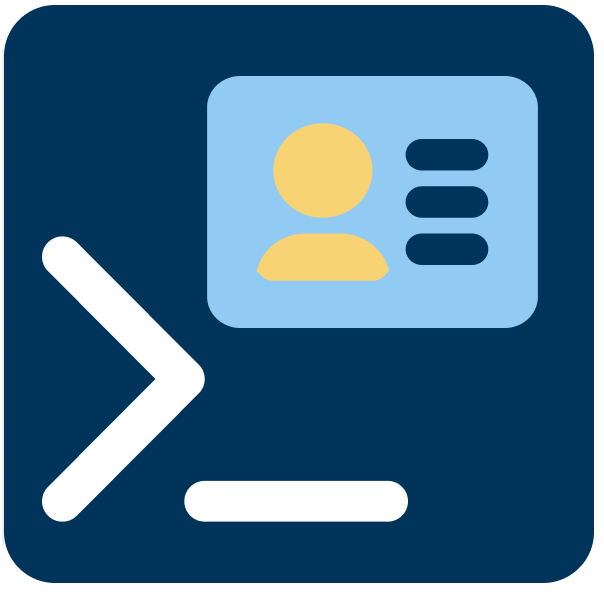https://github.com/larrywisherman/winprofileops
PowerShell module for managing Windows user profiles, including detection and removal of orphaned profiles, registry operations, and remote management support.
https://github.com/larrywisherman/winprofileops
automation powershell registry userprofiles windows
Last synced: 5 months ago
JSON representation
PowerShell module for managing Windows user profiles, including detection and removal of orphaned profiles, registry operations, and remote management support.
- Host: GitHub
- URL: https://github.com/larrywisherman/winprofileops
- Owner: LarryWisherMan
- License: mit
- Created: 2024-09-07T04:33:15.000Z (10 months ago)
- Default Branch: main
- Last Pushed: 2024-10-01T19:27:04.000Z (10 months ago)
- Last Synced: 2025-01-15T20:15:39.196Z (6 months ago)
- Topics: automation, powershell, registry, userprofiles, windows
- Language: PowerShell
- Homepage: https://www.powershellgallery.com/packages/WinProfileOps/
- Size: 352 KB
- Stars: 3
- Watchers: 1
- Forks: 1
- Open Issues: 0
-
Metadata Files:
- Readme: README.md
- Changelog: CHANGELOG.md
- License: LICENSE
- Code of conduct: CODE_OF_CONDUCT.md
- Security: SECURITY.md
Awesome Lists containing this project
README
# WinProfileOps

The **WinProfileOps** module provides a robust toolkit for managing Windows user
profiles on both local and remote computers. This module simplifies and automates
complex profile management tasks, such as detecting orphaned profiles, validating
profile paths, and identifying stale or corrupted profiles. It handles both filesystem
and registry operations, utilizing the **WinRegOps** module for registry-related
functions.
**WinProfileOps** seamlessly integrates with **WinRegOps** to manage profiles by
querying, validating, and auditing user profile-related data from the Windows
registry. This module is ideal for system administrators who want to streamline
profile management operations, especially in environments with numerous users and
computers.
---
## Dependencies
- **WinRegOps**: The **WinProfileOps** module depends on
[**WinRegOps**](https://github.com/LarryWisherMan/WinRegOps) for registry
operations such as querying, opening, and modifying registry keys related to user
profiles.
---
## Key Features
- **Retrieve user profile information** from both the registry and the file system
(local and remote).
- **Detect orphaned profiles**, such as profiles missing from the file system or
registry.
- **Filter and exclude special accounts** like system or service accounts (e.g.,
`defaultuser0`, `S-1-5-18`).
- **Remote profile management** with support for handling user profiles across
different systems.
- **Error handling** for permission issues, unreachable systems, and missing data.
- **Class-based profile objects** for easy integration with other automation tasks
or scripts.
---
## Typical Use Cases
- **Cleaning up orphaned profiles** after system migrations,
user deactivations, or profile corruption.
- **Managing user profiles in large-scale environments**, such as terminal servers,
Citrix environments, or multi-user systems.
- **Excluding system accounts** from profile cleanup operations to prevent accidental
deletion of important system profiles.
- **System maintenance routines** that include profile validation
and management as part of a broader system health check.
---
## Installation
You have two options to install **WinProfileOps**:
1. **Install from PowerShell Gallery**
You can install the module directly from the
[PowerShell Gallery](https://www.powershellgallery.com/packages/WinProfileOps)
using the `Install-Module` command:
```powershell
Install-Module -Name WinProfileOps
```
1. **Install from GitHub Releases**
You can also download the latest release from the
[GitHub Releases page](https://github.com/LarryWisherMan/WinProfileOps/releases).
Download the `.zip` file, extract it, and place it in one of your `$PSModulePath`
directories.
---
## Usage
#### Example 1: Detecting Orphaned Profiles
Use the `Get-OrphanedProfiles` function to detect orphaned profiles on a local or
remote machine:
```powershell
$orphanedProfiles = Get-OrphanedProfiles -ComputerName "RemotePC" -IgnoreSpecial
```
This retrieves all orphaned profiles on `RemotePC`, excluding special accounts.
#### Example 2: Retrieving User Profiles from the File System
Use the `Get-UserProfilesFromFolders` function to retrieve user profile folders from
the file system on a local or remote machine:
```powershell
$userFolders = Get-UserProfilesFromFolders -ComputerName "Server01"
```
This retrieves user profile folders from the default `C:\Users` directory on `Server01`.
#### Example 3: Retrieving User Profiles from the Registry
Use the `Get-UserProfilesFromRegistry` function to query user profiles from the
Windows registry:
```powershell
$registryProfiles = Get-UserProfilesFromRegistry -ComputerName "LocalHost"
```
This retrieves user profiles from the registry on `LocalHost`.
#### Example 4: Auditing User Profiles
Use the `Invoke-UserProfileAudit` function to audit profiles across the file
system and
registry:
```powershell
$allProfiles = Invoke-UserProfileAudit -ComputerName "Server01"
```
This audits user profiles on `Server01`, returning both file system and registry
profile information.
#### Example 5: Removing User Profiles from the Registry
Use the `Remove-UserProfilesFromRegistry` function to remove user profiles from
the Windows registry based on SIDs, Usernames, or UserProfile objects:
- Remove profiles by SIDs:
```powershell
Remove-UserProfilesFromRegistry -SIDs "S-1-5-21-1234567890-1", "S-1-5-21-1234567890-2"
```
- Remove profiles by usernames on a remote computer:
```powershell
Remove-UserProfilesFromRegistry -Usernames "john.doe", "jane.smith"
-ComputerName "Server01" -Force -Confirm:$false
```
- Audit user profiles before removal:
```powershell
Remove-UserProfilesFromRegistry -UserProfiles $userProfileList -AuditOnly
```
**Note:** To bypass any confirmation prompts during profile removal, both the
`-Force` switch and `-Confirm:$false` must be specified.
This allows you to either remove or audit profiles based on their SIDs,
usernames, or UserProfile objects.
---
## Key Functions
- **`Get-OrphanedProfiles`**: Detects orphaned profiles by checking both the
registry and file system.
- **`Invoke-UserProfileAudit`**: Audits and compares profiles from both the registry
and file system, identifying discrepancies such as orphaned profiles.
- **`Get-UserProfilesFromRegistry`**: Retrieves user profiles from the Windows
registry.
- **`Get-UserProfilesFromFolders`**: Retrieves user profile folders from the file
system.
- **`Remove-UserProfilesFromRegistry`**: Removes user profiles from the Windows
registry based on SIDs, Usernames, or UserProfile objects,
with options for audit-only mode or forced removal.
---
## Environment Variables
The **WinProfileOps** module uses several environment variables to configure
certain default paths and behaviors. These variables are automatically set
when the module is loaded and can be adjusted as needed:
- **`$env:WinProfileOps_IsAdmin`**: Determines if the current user has
administrative privileges. It is determined by the current context of the
user.
- **`$env:WinProfileOps_RegistryPath`**: Specifies the registry path used for
managing user profiles. Default value: `"SOFTWARE\Microsoft\Windows NT\CurrentVersion\ProfileList"`.
- **`$env:WinProfileOps_RegistryHive`**: Defines the registry hive used in
operations, set to `LocalMachine` by default.
- **`$env:WinProfileOps_RegBackUpDirectory`**: Specifies the directory where
registry backups are stored. Default value: `"C:\LHStuff\RegBackUp"`.
- **`$env:WinProfileOps_ProfileFolderPath`**: The profile folder path, defaulting
to `"C:\Users"`, but can be customized based on the system's configuration.
These variables are set automatically when the module is imported and are cleared
when the module is unloaded or the PowerShell session ends.